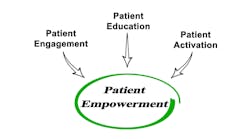For Eric Yablonka, winner of the CHIME/HIMSS John E. Gall, Jr., CIO of the Year Award, being a CIO and doing his best is what it's all about. The vice president and CIO at the University of Chicago Medical Center (UCMC) is modest about the personal accolades but quick to praise his organization as supportive and forward-thinking.
No signature project can be singled out for special attention. Rather, Yablonka cites several, including opening a children's hospital with cutting-edge technology, implementing enterprise resource planning and supply chain systems, major work with clinical and diagnostic imaging systems, building a state-of-the-art wireless infrastructure and developing a great IT team at the academic medical center.
But Yablonka also sees the importance of the human factor. In fact, he is the one credited with spearheading an effort to assist the New Orleans Habitat for Humanity with Hurricane Katrina recovery projects. The day before the Spring CIO Forum, nearly 90 CHIME members, foundation representatives and staff participated in such projects.
"This is not just a risky job, it's a role where you inherently are trying to do very difficult things."
Staff development is also very important to Yablonka, who oversees about 200, including an IT team of 140 plus the clinical engineering, call center and Web marketing groups. At UCMC, there are two strategy channels — one for technology and the other for human capital. "We don't believe we can be successful unless our staff is equipped, successful and capable technically, as well as with soft skills." Mentoring is also an important element in staff development, whether to his staff or to other CIOs through the CHIME mentoring program and CHIME Boot Camp. "I don't just give, I receive as well," he says. "Mentoring is a two-way street."
The CIO of the Year Award honors the late John E. Gall Jr., who implemented the first integrated medical information system in the world at California's El Camino Hospital in the 1960s.
One lesson learned from opening the new children's hospital was the rapid convergence of medical and information technology. It made sense to align clinical engineering together with IT within the organization, Yablonka says. And it has been extremely successful as UCMC has brought in new medical technologies such as IV pumps and monitoring devices, which are all computerized and networked. "How we leverage our technology infrastructure and how we bring those devices in for interoperability really depends a lot on the clinical engineering team and depends a lot on the IT team," he says. "When they're together, working together and aligned together, it's really very powerful."
Speaking of risk-taking, Yablonka says risks are part of the CIO job. "We take very complicated technology, wrap it around a business process that is highly variable and very dynamic and try to make it all work. This is not just a risky job, it's a role where you inherently are trying to do very difficult things. It's very challenging and it's not for the faint of heart, but, on the other hand, it is unbelievably rewarding and very exciting and you get to do really good, meaningful work."
Hard work it is, but Yablonka loves it. "Being a CIO is a gift. It's not a burden. Those of us who do it, love it and we do it because that's what we want to do, not because we feel like we have to do this kind of work," he says. "We do it because it's our life's work and passion. (We are) a very fortunate group and we get to do really good things."


